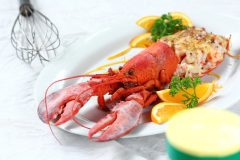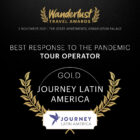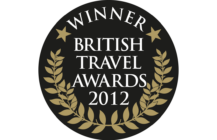With the support of animal welfare specialists Four Paws, we have put together the following top ten tips for travellers to help you minimise the impact of your holiday on animal welfare.
Top 10 tips
Photos
Photograph wildlife in the wild and while respecting their space. Don’t support businesses that interact too closely with wild animals or charge for photos with animals.
Look, but don’t touch
Wild animals aren’t pets looking for belly scratches. Holding or petting wildlife is never kind to the animal despite your best intentions. Close contact with wild animals could cause harm to their environment or to the animals themselves. And for your safety, this goes for stray or feral animals too.
Feeding animals
Feeding wild animals harms their ability to find food naturally and teaches them to get dangerously close to humans – so is discouraged.
Animal care at sanctuaries or with working animals
Sometimes, you’ll see animals in sanctuaries, farms or zoos that are substandard. If you are worried about the welfare of these animals, report it immediately to Journey Latin America, our local operator, or to Red Flag: www.bornfree.org.uk/raise-the-red-flag. A true sanctuary does not breed animals or allow public contact with animals, and cares for the animals for the rest of their lives.
Animals in entertainment or shows
Please don’t support cruel animal exhibits or shows like circuses, performances with marine mammals or any kind of show that involves wild animal performances. These animals are kept in inappropriate conditions and their performances are the result of dubious training methods based on domination or violence. Please don’t support this torture. Avoid making fun of animals and understand that they are sentient beings who deserve our respect and compassion.
Animal products or trinkets
Do not buy trinkets or souvenirs made from animal parts. The illegal trade in wildlife parts and products can include items made with exotic leathers and fur, ivory and ornamental objects, food items, and traditional medicines. Buying these products encourages animal exploitation and poaching of animals from the wild. Products from endangered species are illegal and if detected by customs you can be fined.
Poaching and trophy hunting
It goes without saying that if you are an animal lover, you probably do not support trophy hunting. The killing of wild animals for sport is cruel and unnecessary. Enjoy animals in the wild where they belong, and support companies that offer eco-tourism trips or non-invasive photo safaris.
Working animals
Working mules and horses are commonplace in some countries. If you encounter those that are bred for work and are in doubt that these animals are well cared for, please report it immediately to Journey Latin America or our local operator.
Health and safety
It’s important when you are abroad that you are aware and take care in the presence of animals. Many strays and wild animals are fearful of humans and if approached, handled or attacked, they can pose a real threat to you and your health. Rabies is a serious issue in some countries and can be transferred to humans. If bitten, wash the wound with soap and water, and seek medical attention immediately.
Eating Out
In some countries wild animals, or those we consider our companions, can be found on the menu. These animals, such as dogs and cats, endure immense cruelty and barbaric treatment to end up on a plate, and in some cases could even be people’s stolen pets. There are also risks to your health and diseases, or even poison, that can be present in the meat, as a result of improper slaughter practises or hygiene. Avoid eating at places, including street vendors, that sell wild animal or domestic animal meat, including bush meat or endangered species, such as shark fins, whale and turtle meat.
In Summary
Do…
Make sure to enjoy wild animals in their natural habitat rather than in captivity where possible. Please only support genuine sanctuaries or conservation centres- if you are worried about an animal or institution, let us know as we will act upon it.
Ensure that any domesticated animals that are ridden, like mules or horses, are in good physical condition. It is important that they be well cared for and provided with water and shade.
Think about what you are eating or buying. Avoid buying souvenirs or products made from animals, which are often endangered species. Don’t support cruel food practices, which includes eating turtle eggs or wild animal meat.
Don’t…
Don’t touch, hug, ride or take a photo with a wild animal. It is likely to have suffered from some form of distress or cruelty to make this possible.
Don’t feed wild animals, or support the use of animals to solicit money from tourists. This includes animal shows and performances, selfie photo opportunities, or animals killed for consumption or souvenirs.
Don’t put yourself at risk. Wild animal species are unpredictable and direct contact with such species poses a high risk to people.
Papagaio
Your edit for Latin American inspiration
Our exciting range of articles on Latin America explore everything from iconic destinations and lesser-known cultural gems to delicious traditional recipes. You’ll also find exclusive travel tips, first-hand client reviews and the chance to get your personal questions answered by our travel experts.
View Extraordinary Inspiration










































